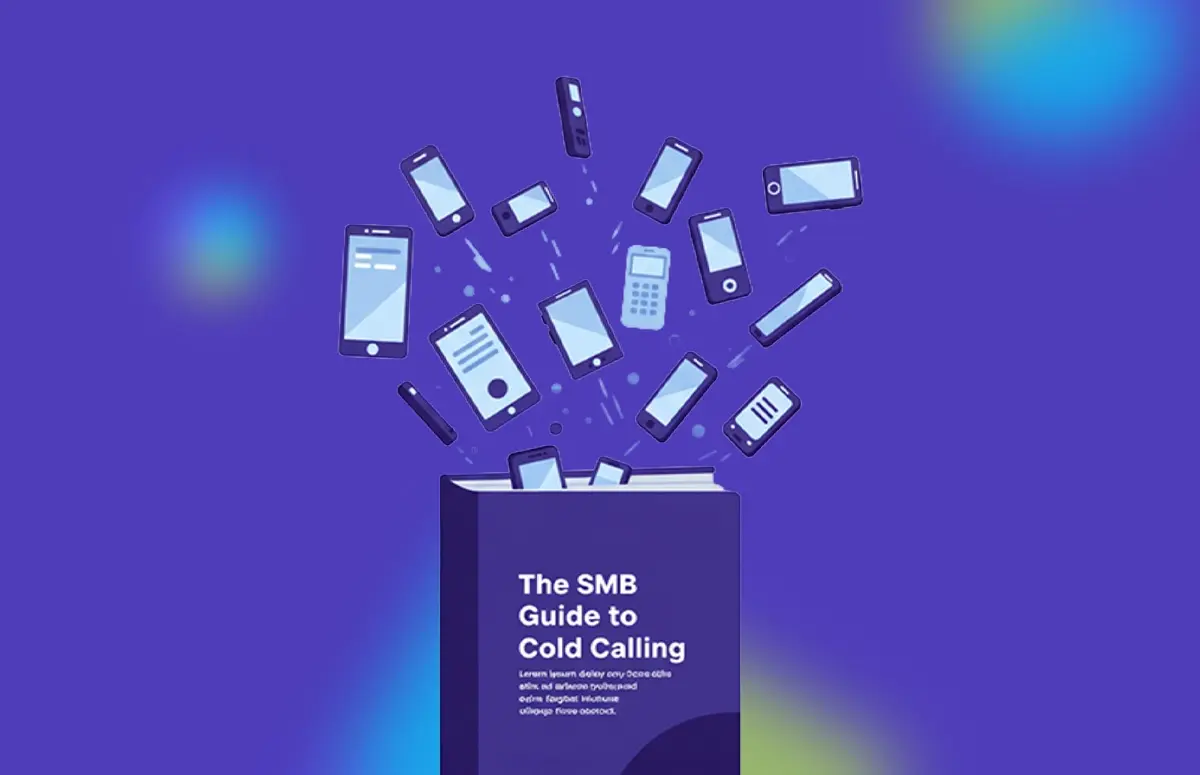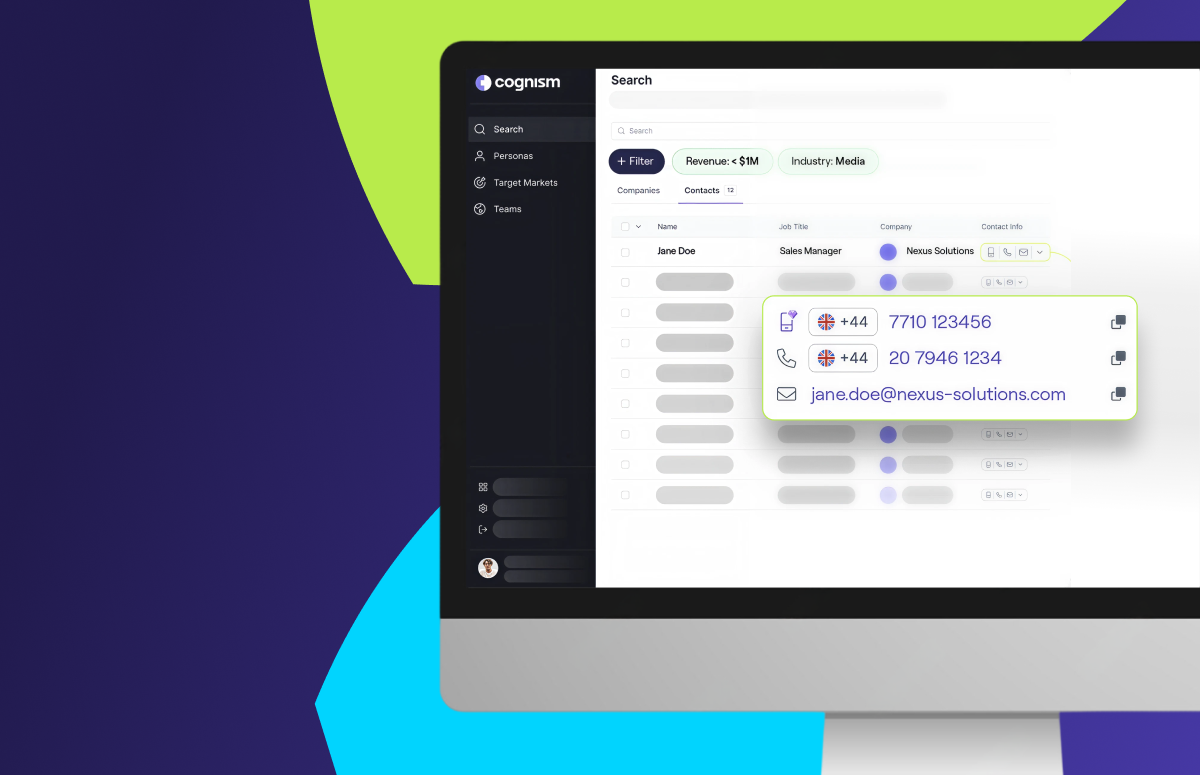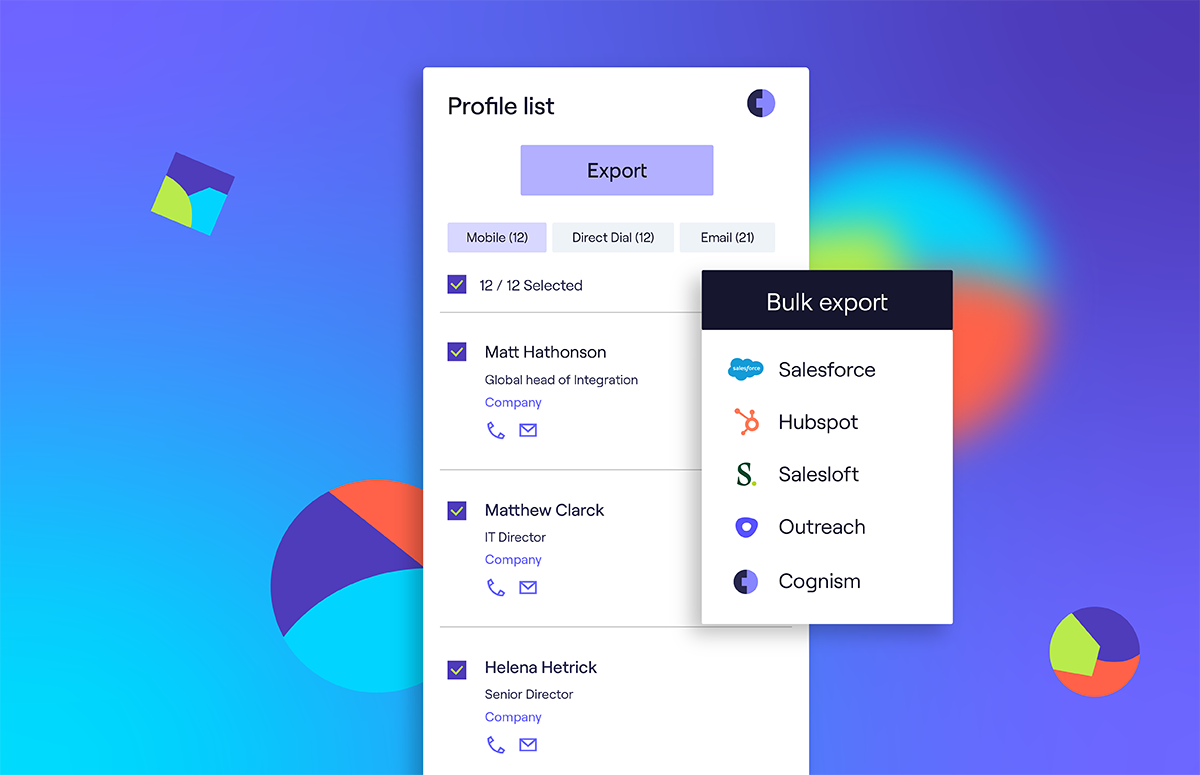9 Habits of Highly Successful Sales Representatives
If you’re looking for some not-so-secret tips on how to become a successful sales rep - look no further!
You might be exploring ways to nail your first job in B2B sales. Or you might be an experienced manager looking to boost your team’s success.
Either way, you’ve come to the right place!
In this blog, we explore what makes a good salesperson, the skills that every sales rep needs, and how you can improve your sales skills to achieve long-term success.
Let’s go 👇
What makes a good salesperson?
A good salesperson is more than someone who can effectively pitch a product or service.
They’re skilled communicators, relationship builders, and problem solvers. These qualities set the foundation for trust and rapport, which are essential for any successful sales relationship.
But what exactly makes a salesperson stand out from the rest?
1. Empathy and customer focus
Empathy is at the core of every successful salesperson.
Understanding your customer’s needs, pain points, and desires allows you to offer tailored solutions that resonate on a deeper level.
Empathy goes beyond just listening – it’s about seeing the world from the customer’s perspective and building genuine relationships.
Great salespeople place the customer at the centre of everything they do. By adopting a customer-centric approach, you focus on solving problems rather than just pushing products.
Customers appreciate when a salesperson takes time to understand their unique challenges and offers personalised solutions.
2. Resilience and persistence
B2B sales is an industry full of ups and downs, and rejection is inevitable. A good salesperson knows that persistence is key to success.
The ability to bounce back after a rejection, learn from the experience, and approach the next opportunity with renewed energy is essential. It helps you maintain motivation, even when you face multiple rejections in a row.
Madeleine Hopkin, Cognism Account Executive, had many rejections at the beginning of her SDR journey.
But she quickly learned the golden rule: it’s not personal.
Maddie explained:
“I wasn’t a particularly strong SDR to start with. I actually found it quite difficult to book meetings and didn’t hit target in my first month.”
“For me, the key was being super resilient. So removing my ego from the ‘no’s’, realising that they’re not rejecting me as a person, they’re just rejecting the product.”
The SDR position is inherently challenging, but resilience is what makes a good SDR.
Maddie added:
“You need to trust the process in the sense that you’re putting in the hard work, you’re turning up, being super curious, being enthusiastic, asking questions and throwing yourself into doing a lot of cold outreach.”
And how do you build resilience?
Maddie told us:
“The best SDRs don’t put off the task they find the scariest. For me, that task was cold calling.”
“So I’d make sure that I prioritise cold calling in my day, and then that way, you’re naturally going to improve. But you’ve got to push yourself out of your comfort zone.”
The moral of the story is that through resilience, you can transform initial setbacks into success.
3. Adaptability
The sales landscape constantly evolves, and successful salespeople can adapt to changes quickly.
Adaptability is crucial for staying relevant and practical when adjusting to new market trends, learning to use new technology, or altering sales strategies based on customer feedback.
Flexibility allows you to thrive in different environments and meet the ever-changing needs of your customers.
4. Confidence and self-belief
Confidence is vital in sales, as it helps build trust and authority.
A confident SDR is more likely to inspire confidence in their customers, which can be the deciding factor in whether a deal closes or not.
However, this confidence should not come across as arrogance – the best salespeople maintain a delicate balance between confidence and humility.
5. Passion and enthusiasm
Enthusiasm is contagious. When a salesperson is genuinely excited about what they’re selling, it shines through in every customer interaction.
Passion not only helps to engage your customers but also fuels your sales motivation and drive to succeed. Customers are more likely to buy from someone who truly believes in their product or service.
What are the most important skills every sales rep needs?
Being a great salesperson requires a combination of soft and hard skills.
While personal attributes like empathy and confidence are important, having a solid skill set to support these qualities is essential for achieving consistent success.
Here’s a list of the top skills needed to be a successful sales rep:
1. Effective communication
Strong communication skills are the foundation of successful sales. SDRs must be able to articulate the benefits of their product or service clearly and concisely.
But communication isn’t just about talking – active listening is equally important. Being a good listener helps you understand your customers’ needs and concerns, allowing you to offer more relevant solutions.
Beyond verbal communication, salespeople should also be adept at written communication.
Whether crafting compelling emails or presenting data to a potential client, the ability to communicate in writing is a valuable skill that can significantly improve deal closing.
2. Product knowledge
To sell effectively, you need to understand the product or service you’re offering.
Customers can tell when a salesperson is uncertain or lacks knowledge about what they are selling, which can undermine trust.
A sales rep who can confidently answer questions and demonstrate how their product solves a specific problem will be much more persuasive.
Maddie said:
“If you know the product you’re selling, you’re more likely to approach the prospect from a unique perspective every time.”
“So it means you will tackle the specific problem they want to solve, rather than selling to everyone with the same approach.”
Product knowledge also enables salespeople to handle objections more effectively. They can quickly address concerns and provide detailed answers that put the customer at ease.
The more you sell irrelevant features, the less engaged your prospect will be!
Maddie cautioned:
“Knowing which part of the product relates to their question is super important.”
“If you can’t provide an answer when they ask about a specific aspect of the tool during the call, you might need to find the information and get back to them. At that stage, the opportunity could be lost.”
Knowing your product inside out is one of the critical SDR best practices. It’s a guiding compass in complex scenarios - don’t forget it!
3. Negotiation skills
Negotiation is a critical aspect of the sales process. Successful sales reps know how to find a win-win solution that satisfies both the customer and the company.
This requires a deep understanding of your customer’s needs and your product’s value, as well as the ability to be flexible and creative in finding solutions.
Good negotiators are not focused solely on price. SDRs know how to communicate the full value of their product and service, allowing them to navigate discussions around budget constraints or additional requirements.
4. Time management
Sales is often fast-paced, and salespeople must juggle multiple tasks simultaneously.
From following up with leads to attending meetings and preparing presentations, effective time management is essential to stay organised and productive.
Successful sales reps know how to prioritise their time, focusing on high-value tasks and leads most likely to convert.
They also use tools like CRM systems to keep track of client interactions, ensuring they don’t miss any follow-ups or essential touchpoints.
5. Emotional intelligence
Emotional intelligence (EQ) refers to the ability to understand and manage one’s own emotions while recognising and responding to those of others.
High EQ helps salespeople navigate complex customer interactions, handle cold calling objections gracefully, and build strong relationships based on mutual trust.
Sales reps with high emotional intelligence are often better equipped to manage stress, communicate effectively, and empathise with customers – all of which contribute to long-term success.
How can you improve your sales skills?
Sales isn’t a static profession – it’s essential to keep evolving, learning, and refining your approach to stay ahead of the competition.
Here are some practical steps to help you improve your sales skills:
1. Seek out mentorships
One of the most effective ways to improve as a salesperson is to learn from those who have already achieved success.
Seek mentors or senior salespeople within your organisation who can offer valuable advice, share best practices, and provide guidance on overcoming challenges.
For many SDRs, this means building a solid relationship with your Account Executive (AE).
Charlie Bell, Commercial Consultant at Zembl, said:
“The AE-SDR relationship is extremely important because you approach accounts as a team. You’re bringing in the correct meetings for your AE; they’re feeding back to you if they want different people looped in.”
Most AEs were high-performing SDRs themselves - they know the drill!
This makes them an excellent source of knowledge.
So, how can you establish this mutually beneficial relationship?
Charlie explained:
“You have to always show that you care about their time. The AE’s time is extremely important, so if you value it, they’ll open up and respect you. They’ll be happy to support you and give you training.”
Providing AEs with well-qualified opportunities is an integral part of how to be a successful SDR.
It proves you’re invested in the AE’s success rather than looking for a shortcut to quota.
2. Stay genuine
That said, when it comes to B2B sales, don’t just copy what your peers do.
Certain phrases that are natural for your mentors might be tricky for you to deliver.
Be yourself and make it your own.
We all hear the word “salesy” get thrown around, and we get what it’s about. Sounding too scripted or fake will put people off.
Different things work for different people - especially with cold calling!
Ashleigh Early, Host of The Other Side of Sales podcast, said:
“Your clients are diverse. If you don’t have a diverse team that can get creative and approach the world with different perspectives, how will you help every client in different situations and perspectives?”
A good idea is to A/B test your calls - try out one style or cold calling script for one week and a different style for the next. Track your results over time.
Which cold call style was the most successful? Then, use the winning method for your future calls.
If you’re genuine, this will shine through in your interactions with prospects and customers. You’ll stand out, making them all the more likely to engage with you.
That said, the goal of any cold call should always be to have a conversation.
Josh Braun calls this “detaching from the outcome.” He said:
“When people feel sales pressure, they pull away. Talking people into things doesn’t work because of this pressure. This is called the backfire effect.”
“Instead, you need to detach from the outcome. When you reduce the pressure, prospects feel they can trust you. They sense you don’t have an ulterior motive to get the meeting.”
“The real goal should be to get to the truth behind every conversation with a prospect.”
Again, it’s about being genuine, not salesy. The less pressure you put on your prospects, the more inclined they’ll be to listen to you.
So, be open-minded and curious about your prospects and their pain points.
When you show curiosity, you’re showing the prospect that you’re interested and that you care.
You’re showing them that you’re not trying to book a meeting for the sake of it. You’re not like every other sales rep; you’re someone who genuinely wants to help them.
3. Embrace feedback
Feedback is a powerful tool for growth, but it’s often underutilised.
Whether it’s feedback from your sales manager, colleagues, or even customers, take the time to reflect on what you can learn from each piece of advice.
Constructive feedback helps you identify areas for improvement, allowing you to fine-tune your approach and become more effective over time.
Don’t shy away from asking for feedback regularly – it shows that you’re committed to improving and open to learning.
4. Continuously learn
The most successful salespeople are those who never stop learning.
Whether through books, sales podcasts, webinars, or SDR training programmes, keep updated with the latest trends, techniques, and industry insights.
Sometimes, the best way to learn is to listen to what your prospects have to say and approach every cold call with an open and curious mindset.
It’s all too easy to become overly focused on the outcome of a conversation. Every sales rep has targets to hit, and everyone wants to reach the bottom line.
But if you’re too focused on getting your way, you’ll risk missing out on crucial info your prospect might be giving you.
According to Gong, top salespeople talk for around 46% of calls, while the prospects speak for 54%.
Make sure you’re actively listening to everything your prospects tell you.
That way, you can give them pinpoint responses that address their pain points and be prepared for those same issues on future calls.
Jennifer Gray, Account Manager at Cognism, said:
“Listen to the prospect and what they have to say. It helps you build rapport on a cold call.”
“Take note of the prospect’s pain points. Use them to open up conversations to help them.”
When you actively listen, you put the prospect at the heart of your outreach, and you’ll continuously learn along the way!
5. Role play and practice
One of the best ways to improve your sales skills is through role-playing.
Practising your sales pitch with a colleague or mentor lets you receive immediate feedback and fine-tune your delivery.
You can simulate different scenarios, such as handling objections, negotiating terms, or navigating challenging customer personalities.
Regular practice helps you become more comfortable and confident in real-world situations, ensuring you’re well-prepared when it’s time to close the deal.
6. Develop your personal brand
It’s never too early to start building your network - that’s where creating a personal brand comes in.
It can set you apart from other sales reps and establish you as a trusted authority.
Sharing your expertise on social media, attending networking events, or writing blogs on industry topics can increase your visibility and credibility with potential clients.
Customers who see you as a thought leader or expert are more likely to trust your recommendations and view you as a valuable partner, not just a salesperson.
Sales veteran and CEO Morgan J. Ingram said:
“If you’re putting out content where your audience is - and they know who you are - you’ll have less resistance when prospecting.”
Start by scheduling some posts and interacting with your audience. Grow and nurture your online following. That way, people will start prospecting to you instead of the other way around!
David Bentham, Cognism’s former Director of Sales Development, told us about something he does with new sales reps:
“When they join, I give them lists of the top B2B sales influencers - people like Josh Braun, Ryan Reisert, Shabri Lakhani, etc.”
“I encourage all my new starters to follow them. Let them learn from the best!”
7. Keep track of everything
Sales admin can quickly become the bane of your existence, but it can also be your best friend!
Make sure you have an organised system. You’ll want to keep track of call notes, follow-ups, and next steps.
Trust us, if you don’t organise your admin, you’ll miss out on opportunities.
Find a method to track everything that works for you. Whether online, in a document, using an app, or creating tasks in your CRM.
It’ll help you when you reach out to your next prospect.
8. Analyse your performance
It is important to review your performance regularly and track key sales metrics to improve your skills.
By analysing your conversion rates, lead response times, or even the types of objections you encounter, you can identify patterns and areas for improvement.
Setting specific goals and using data-driven insights to guide your improvements can lead to more consistent results and a higher level of performance.
Achieving these sales goals will not only boost your motivation but also give you a sense of accomplishment.
9. Master time management tools
Countless tools and apps are designed to help you manage your time more effectively.
From CRM systems to email automation tools, use technology to streamline your tasks and focus on what matters most: closing deals and nurturing customer relationships.
Experiment with different tools to find out what works best for you, and don’t hesitate to adapt your workflow to become more efficient.
Here are a few tool resources to help you choose the most helpful tech:
- The Ultimate Sales Tech Stack Approved by Cognism
- 11 Must-Have SDR Tools to Drive More Sales
- Best Sales Tools & Software Chosen by B2B Sales Leaders
Succeeding as an SDR: one last tip
If you really want to be a successful sales rep, then check out Cognism’s SDR Zone!
It’s jam-packed with resources, including cold call scripts, full cadences, podcast interviews and more.
Click 👇 to access.



